That's all from today's briefingpublished at 13:40 BST 28 August 2020
You will shortly be able to watch the briefing on demand, using the BBC iPlayer or the play icon at the top of the page.
Chief constable Iain Livingstone says indoor gatherings "should be avoided"
Mr Livingstone insists new powers to break up house parties with more than 15 people will be used as "last resort" only
A total of 51 people have tested positive for Covid in the past 24 hours - no new deaths have been recorded
The first walk-through testing centre is to open in St Andrews today
Two countries have been added to the list for quarantine restrictions - the Czech Republic and Jamaica - but Cuba has been removed
Parents should be reassured by a new study which shows the proportion of children who get severe Covid-19 is "rare" and death is "vanishingly rare", its authors have said
BBC Scotland News
You will shortly be able to watch the briefing on demand, using the BBC iPlayer or the play icon at the top of the page.
Allow X content?
This article contains content provided by X. We ask for your permission before anything is loaded, as they may be using cookies and other technologies. You may want to read X’s cookie policy, external and privacy policy, external before accepting. To view this content choose ‘accept and continue’.
Allow X content?
This article contains content provided by X. We ask for your permission before anything is loaded, as they may be using cookies and other technologies. You may want to read X’s cookie policy, external and privacy policy, external before accepting. To view this content choose ‘accept and continue’.
The Sun’s Chris Musson, referring to new Scottish government coronavirus modelling, asks why deaths remain so low and whether the virus is getting less lethal.
The first minister says: "Nothing I have been advised gives me the confidence to stand here and say the virus is getting less lethal."
She says there has been a reduction in hospital admissions and patients in intensive care but urges caution as hospitalisations could increase in the weeks ahead.
National clinical director Jason Leitch accepts the emergence of a less lethal virus is possible but "the mainstream science says no".
He also urges caution, saying post-lockdown infections appear to be in younger populations, who will have less several symptoms, but there are still vulnerable people who can be infected as we reopen.
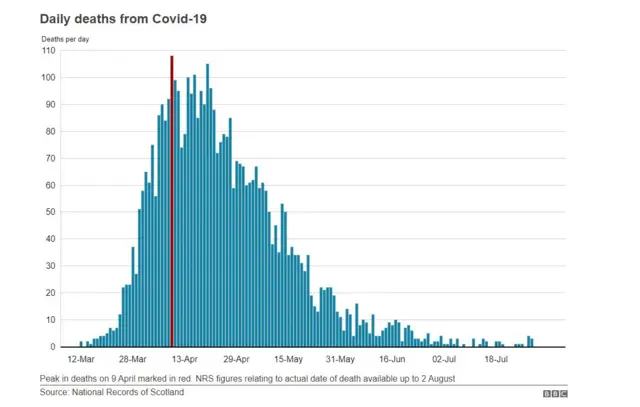
Allow X content?
This article contains content provided by X. We ask for your permission before anything is loaded, as they may be using cookies and other technologies. You may want to read X’s cookie policy, external and privacy policy, external before accepting. To view this content choose ‘accept and continue’.
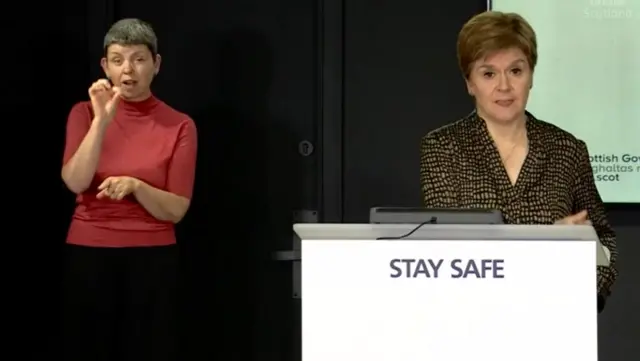
In response to the question on quarantine restrictions, Ms Sturgeon says the police are the "last resort" in enforcement.
The first minister says Public Health Scotland contact 100% of people who come into the country from quarantine countries by email initially.
They then follow up a random sample through telephone calls, she says.
Their original target was 20% of travellers, up to a maximum of 450 per week.
In the week to 23 August they contacted 959 travellers coming into the country. She said the percentage of successful contacts in that week increased to 84%.
Ms Sturgeon says Public Health England samples about 1,000 eligible arrivals per day.
"Proportionately we are seeking to have a robustness to what we are doing," she says.
Neil Pooran from the Press Association asks if the government can do anything to prevent workers feeling forced to go back into offices earlier than they are comfortable with.
The first minister says the vast majority of employers have been "excellent" in working with the government to suppress the virus.
It comes as the UK government prepares to launch a campaign to encourage people to go back to work, with employers asked to reassure staff it is safe to return to the office.
She reiterated that the Scottish government's guidance is to work from home whenever possible, saying peopled doing so should not feel that this is "somehow making their job less secure".
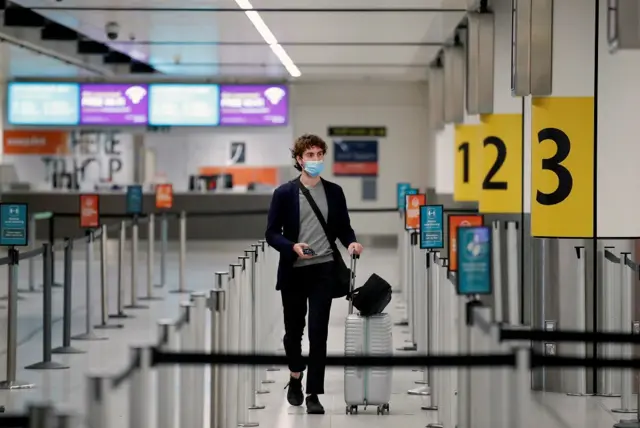 Image source, PA Media
Image source, PA MediaConor Matchett from The Scotsman asks how many people coming into Scotland have broken the quarantine restrictions.
He also asks how many people have been interviewed by Police Scotland for potential breaches.
Police Scotland chief constable Iain Livingstone says policing is very much the "back stop" when it comes to enforcing these requirements.
He says there have been about 200 referrals from either the Home Office and Public Health Scotland.
The chief constable says they try to get people on the phone but in about a quarter of cases officers have "physically attended" and spoken to people.
He says the police do follow-up visits if needed.
Mr Livingstone says the police have 65,000 had "interactions" with the public across the coronavirus period but there have only been about 3,500 fixed penalty notices (about 5%).
He says the police's approach is to persuade people to do the right thing and enforcement is only necessary when they refuse to do that.
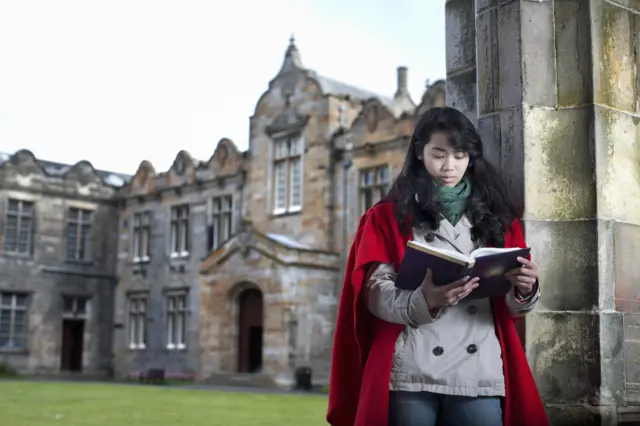 Image source, Getty Images
Image source, Getty ImagesIn response to a question about the potential spread of the virus among students returning to university next month, Ms Sturgeon talks about international students.
She says: "If they are coming from any of the countries that are on our quarantine list there is an obligation to quarantine for 14 days, which we think at the moment is a more effective way of stopping importation of the virus from high-risk countries than testing."
ITV Border’s Clare McNeill asks the first minister whether the outbreak in Hawick is being contained and what number of cases would be required before the government considers a local lockdown.
The first minster says it is too early to say the outbreak is under control but she is not “particularly concerned that it’s not under control.”
She says it takes time to know how the outbreak will develop, but nothing in the latest figures suggests the outbreak is not under control.
On local lockdown more generally, the first minister says a variety of factors are involved in deciding restrictions, not just the number of positive cases.
Colin Wight from STV asks about the study about Covid-19 and its effect on children.
The BMJ study, external said children's risk of needing hospital treatment for coronavirus is "tiny" and critical care "even tinier".
National Clinical Director Jason Leitch said: "It is the biggest single study of Covid that we have had so far."
He thinks there is "considerable reassurance" to be taken from it, especially in children under 15.
Prof Leitch says people still need to look after themselves and their loved ones.
BBC Scotland's Catriona Renton asks whether new police powers are enforceable after the Scottish Police Federation chairman David Hamilton told Good Morning Scotland that the legislation contained "loopholes."
Chief constable Iain Livingtsone said emergency police powers to enforce coronavirus guidelines have had to be introduced "in relatively short term."
He says police will enforce public health rules but sanction will be the "last resort", instead preferring encouragement.
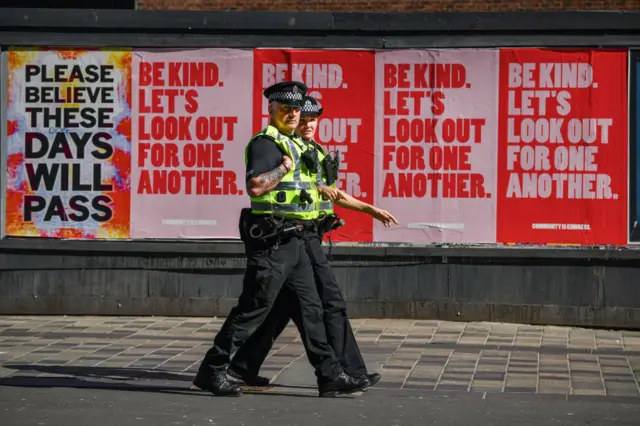 Image source, Getty Images
Image source, Getty Images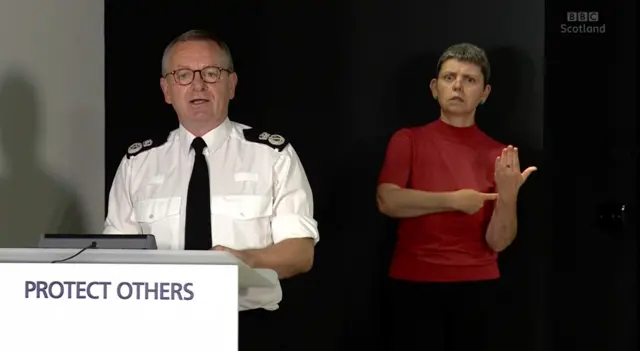
Chief constable Iain Livingstone says the advice on indoor gatherings remains that they "should be avoided".
He reiterates that new powers to disperse indoor gatherings of more than 15 people will only be used as a last resort.
He says he has repeatedly expressed his concerns for children and young people but the risk of passing the virus indoors is still too high.
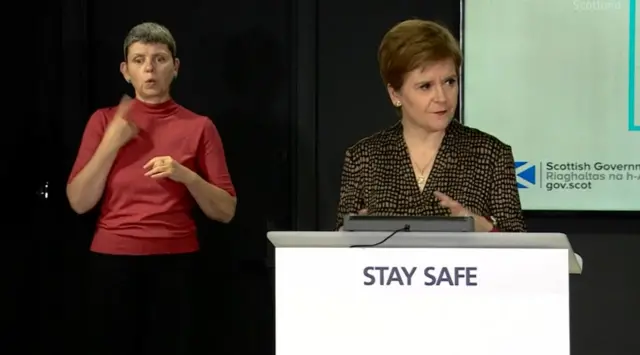
Nicola Sturgeon says police have new powers to break up gatherings in homes of more than 15 people.
"These powers will allow police to stop events that are significantly in breach of the current guidelines and which therefore have the potential to transmit the virus between lots of people from different households," Ms Sturgeon says.
As always, she stresses again people must follow the five pieces of advice in FACTS: They are:
The first minister says the first walk-through testing centre is to open in St Andrews today.
She says the site is close to the centre of town and easy to reach without a car.
Ms Sturgeon says it is still advisable to book these tests.
The plan is to have six walk-through centres by the end of September, mainly in areas with large student populations.
There will be a further five in October and 22 in total during the winter.
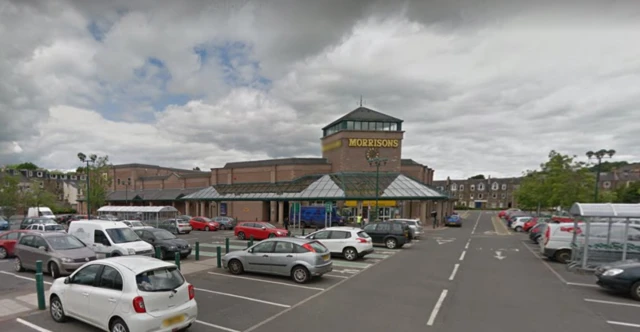 Image source, Google
Image source, GoogleA supermarket is among a number of businesses linked to the outbreak in Hawick
There is also a small outbreak in Hawick in the Borders.
A further four cases were notified yesterday taking the number in that cluster to 11.
All contacts are being followed and self-isolation and testing has been recommended.
There will be a mobile testing unit in the town until Wednesday.
In relation to the cluster in Aberdeen, there are still 263 cases associated with the pub cluster.
The total number of cases in the Grampian region over the past month is now 447, which is an increase of 10 since yesterday.
It remains the view that the outbreak in Grampian is under control, Ms Sturgeon says.
Ms Sturgeon turns to the situation at Kingspark School in Dundee where in total there are 36 cases, two more than yesterday.
22 are staff members, 11 are contacts and three are pupils in the same class.
She says again there is no evidence of wider community transmission.
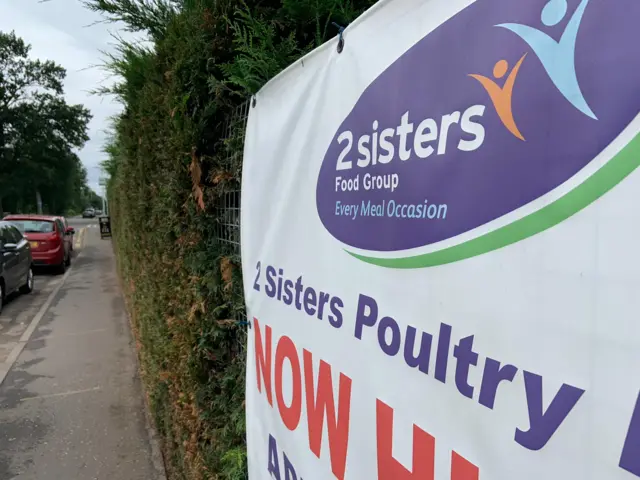
The first minister says as of yesterday there were 177 positive cases linked to the 2 Sisters cluster in Coupar Angus.
157 were workers and 20 were contacts and in total that's an increase in 11 cases in the past 24 hours.
Ms Sturgeon stresses there is no evidence of wider community transmission.